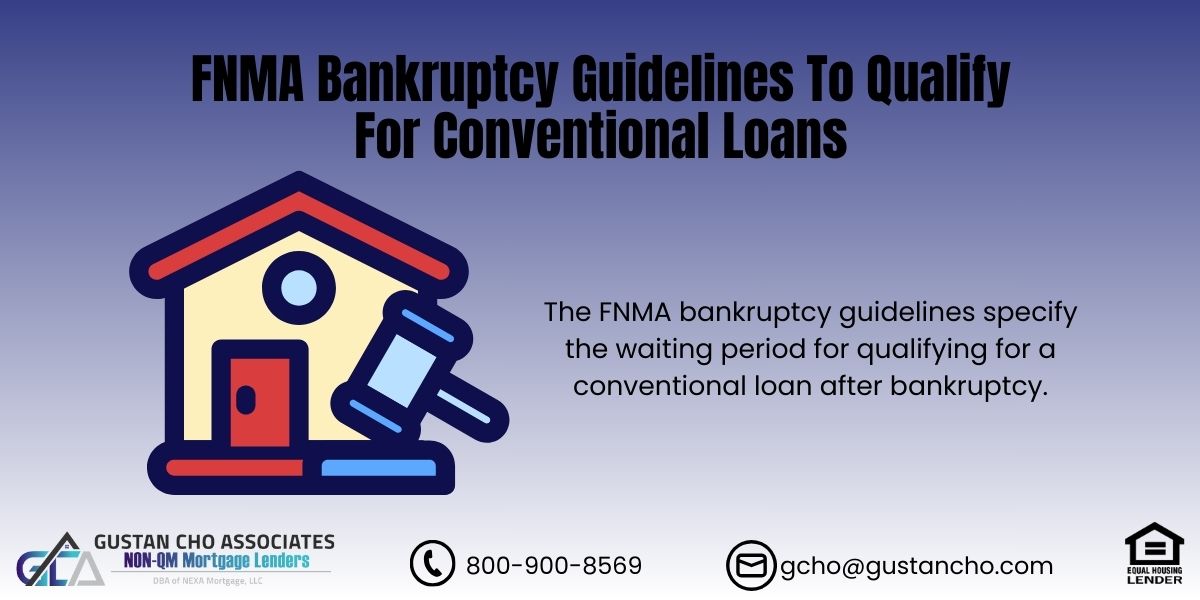FNMA Bankruptcy Guidelines To Qualify For Conventional Loans
FNMA Bankruptcy Guidelines for 2024: Qualifying for a Conventional Loan After Bankruptcy
Navigating the mortgage world after bankruptcy can feel overwhelming, but it doesn’t have to be. If you’re hoping to buy a home or refinance, you’re probably wondering what your options are, especially when getting approved for a conventional loan. Fannie Mae (FNMA) plays a big role here because it sets the rules lenders must follow to offer conventional loans. Even if you have filed for bankruptcy, you are still eligible for a conventional loan, provided you adhere to Fannie Mae’s criteria.
In this blog, we’ll break down the FNMA bankruptcy guidelines in simple terms to help you understand what’s required and how you can still get that dream home.
What Are FNMA Bankruptcy Guidelines?
Fannie Mae is not a government agency, but it works closely with lenders by setting the rules for conventional loans. Lenders follow these rules because Fannie Mae buys the loans after they’re funded, allowing the lenders to free up money and continue lending to other borrowers. If a loan doesn’t meet FNMA’s guidelines, Fannie Mae won’t buy it, and most lenders don’t want to hold onto loans in their portfolios for too long. This is why it’s essential that conventional loans “conform” to FNMA’s standards.
The FNMA bankruptcy guidelines specify the waiting period for qualifying for a conventional loan after bankruptcy. Whether you’ve gone through Chapter 7 or Chapter 13 bankruptcy, you must meet a waiting period before you can be eligible for a new loan.
Let’s break it down further, starting with how the process works. Speak With Our Loan Officer for Conventional Loans
How Does the Mortgage Process Work?

When you apply for a mortgage, here’s what happens:
- Lenders Fund Your Loan: When you qualify for a mortgage, your lender uses a line of credit, called a “warehouse line,” to fund your loan.
- Lenders Sell the Loan: Once your loan is funded, lenders need to sell it to free up money to offer loans to other borrowers. This is where Fannie Mae comes in.
- Fannie Mae Buys the Loan: As long as the loan meets FNMA guidelines, Fannie Mae buys it, and the lender can pay off their warehouse line and continue lending.
This process only works if the loan meets Fannie Mae’s standards, which include its bankruptcy guidelines. Let’s focus on what it takes to qualify after bankruptcy.
FNMA Bankruptcy Guidelines for 2024
When it concerns qualifying for a conventional loan after bankruptcy, these are the crucial waiting periods that you should be aware of:
1. Chapter 7 Bankruptcy:
- Waiting Period: 4 years from the discharge date.
- What This Means: You must wait at least 4 years after your Chapter 7 bankruptcy is discharged before qualifying for a conventional loan.
- Key Update for 2024: The waiting period remains the same, but sometimes, an “extenuating circumstance” could reduce the waiting period to 2 years. Extenuating circumstances are rare but might include a significant life event like a severe illness or job loss beyond your control.
2. Chapter 13 Bankruptcy:
- Waiting Period After Discharge: 2 years from the discharge date.
- Waiting Period After Dismissal: 4 years from the dismissal date.
- What This Means: If your Chapter 13 bankruptcy has been discharged (meaning all payments were successfully made), you only need to wait 2 years to qualify for a conventional loan. If Chapter 13 were dismissed, it would be a 4-year wait.
- Key Update for 2024: If you’ve consistently made on-time payments throughout your Chapter 13 repayment plan, you might qualify for a conventional loan as soon as 2 years after the discharge.
3. Mortgage Included in Bankruptcy:
- Special Case: If your mortgage was included in your bankruptcy, the clock starts from the bankruptcy discharge date, not from when the mortgage was foreclosed or transferred.
- Key Update for 2024: This rule still applies, making it more flexible for borrowers who included their mortgage in a bankruptcy. After the mortgage has been discharged in bankruptcy and is no longer under your name, you are eligible to apply for a conventional loan four years after the bankruptcy discharge date.
Click Here To Apply For Mortgage Loan on Low Payment after Bankruptcy
FNMA Guidelines on Late Payments After Bankruptcy
One of the most critical factors lenders look at is your payment history after bankruptcy. Late payments after bankruptcy can severely hurt your chances of getting a mortgage. Here’s what you need to know:
- Late Payments Are a Red Flag: Lenders consider late payments after bankruptcy highly negative.
- Can You Still Qualify? While one or two late payments may only partially disqualify you, they can complicate the process. It’s essential to keep a clean payment history after bankruptcy.
- Automated Underwriting: Fannie Mae uses an automated system to assess your eligibility. If late payments are on your record, the system will flag them, making approval harder to obtain.
Pro Tip: If you’re struggling to keep up with payments after bankruptcy, consider contacting a financial advisor or your lender for help before it becomes a problem. Keeping your credit clean is vital for qualifying for a mortgage after bankruptcy.
Understanding Debt-to-Income Ratios (DTI)
Your debt-to-income ratio is another important consideration when deciding if you are eligible for a traditional loan following bankruptcy. Fannie Mae has strict DTI limits:
- Maximum DTI: Generally, your DTI should not exceed 50%.
- What This Means: Your monthly debt payments, including your new mortgage, cannot exceed 50% of your gross monthly income.
Managing your DTI is important, especially after bankruptcy, because lenders want to ensure you can handle your debt responsibly.
Credit Score Requirements for FNMA Loans After Bankruptcy
The lowest credit score required to be eligible for a Fannie Mae-backed conventional loan is 620. However, after a bankruptcy, it’s important to improve your credit score to ensure you’re in a better position when applying. Here are a few tips:
- Make On-Time Payments: Payment history makes up much of your credit score.
- Keep Credit Card Balances Low: Compared to your credit limit, maintaining high balances can negatively impact your credit score.
- Don’t Open New Credit Accounts Unnecessarily: New credit accounts can lower your score temporarily and signal financial instability to lenders.
Planning for Your Next Mortgage: Steps You Can Take Now
While you wait to qualify for a conventional loan after bankruptcy, there are several things you can do to prepare:
- Improve Your Credit Score: Always make timely payments on all your bills and refrain from acquiring additional debt.
- Monitor Your Credit: Be sure to review your credit reports regularly for inaccuracies. If you find any errors that could be impacting your score, challenge them.
- Save for a Down Payment: Remember to begin setting aside funds for your down payment. The larger your initial payment, the more favorable loan terms you may be offered.
- Reduce Your DTI: Pay down any existing debt to lower your debt-to-income ratio.
- Consult with a Mortgage Broker: Connect with a skilled mortgage broker who can help you comprehend the process and explore the most appropriate loan options when prepared.
Final Thoughts on FNMA Bankruptcy Guidelines
Recovering from bankruptcy and getting approved for a conventional loan might seem daunting, but it’s possible. By understanding the waiting periods, improving your credit, and managing your debt-to-income ratio, you can set yourself up for success.
Ready to take the next step? Whether you’re thinking about buying a home or refinancing, Gustan Cho Associates is here to help. With years of experience helping borrowers navigate the mortgage process after bankruptcy, we’ll guide you every step of the way.
Feel free to contact us today at 800-900-8569 or send us an email at gcho@gustancho.com to discover the possibilities and learn how you can begin your path to owning a home, even following bankruptcy. Speak With Our Loan Officer About FNMA Bankruptcy
Frequently Asked Questions About FNMA Bankruptcy Guidelines:
Q: What are FNMA Bankruptcy Guidelines?
A: FNMA bankruptcy guidelines are the rules set by Fannie Mae that tell you how long you need to wait after filing for bankruptcy before you can qualify for a conventional mortgage loan.
Q: What is the Waiting Period for Obtaining a Conventional Loan After Filing for Chapter 7 Bankruptcy?
A: FNMA bankruptcy guidelines state that you must wait 4 years after the discharge date of a Chapter 7 bankruptcy to be eligible for a conventional loan.
Q: What is the Waiting Period for a Chapter 13 Bankruptcy?
A: Under FNMA bankruptcy guidelines, the waiting period is 2 years after a Chapter 13 bankruptcy is discharged or 4 years after it is dismissed.
Q: Am I Eligible for a Conventional Loan if My Mortgage was Part of the Bankruptcy?
A: Yes, if your mortgage was included in the bankruptcy, FNMA bankruptcy guidelines state that you must wait 4 years from the bankruptcy discharge date, even if the foreclosure or transfer happened later.
Q: What Minimum Credit Score is Required to Get a Conventional Loan After Bankruptcy?
A: Fannie Mae requires a 620 minimum credit score for eligibility for a conventional loan, even if you have experienced bankruptcy.
Q: Can Late Payments After Bankruptcy Affect my Ability to Get a Mortgage?
A: Yes, FNMA bankruptcy guidelines emphasize that late payments after bankruptcy can negatively affect your chances of qualifying for a mortgage, so it’s essential to maintain a clean payment history.
Are There Any Exceptions to the Waiting Periods for the FNMA Bankruptcy Guidelines?
A: In rare cases, extenuating circumstances like a severe illness or job loss may reduce the waiting period for Chapter 7 bankruptcy to 2 years, but this is evaluated on a case-by-case basis.
Q: What Does DTI Mean, and How Does it Affect My Mortgage Approval?
A: DTI, the debt-to-income ratio, represents the portion of your monthly earnings allocated to debt repayments. According to FNMA’s bankruptcy criteria, your DTI must be at most 50% to be eligible for a conventional loan.
Q: How Can I Up My Chances of Getting Approved After Bankruptcy?
A: To improve your chances of success, focus on raising your credit score by paying on time, keeping credit card balances low, and avoiding opening new credit accounts after filing for bankruptcy.
Q: What Should I do While Waiting to Qualify for a Mortgage After Bankruptcy?
A: During the waiting period outlined by FNMA bankruptcy guidelines, work on improving your credit, lowering your DTI, saving for a down payment, and consulting a mortgage broker to guide you through the process.
This blog about “FNMA Bankruptcy Guidelines To Qualify For Conventional Loans” was updated on October 4th, 2024.







